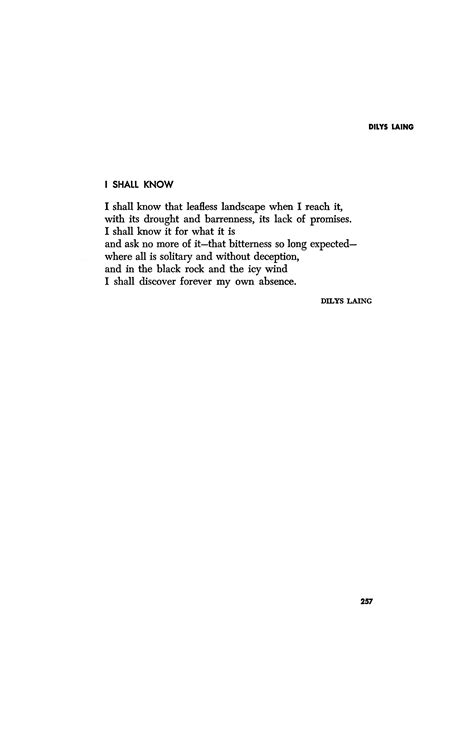A Quote by Virginia Woolf
Her only gift was knowing people almost by instinct, she thought, walking on. If you put her in a room with someone, up went her back like a cat's; or she purred.
Related Quotes
She lay on her back and walked her fingers down her ribs, skipped them over her abdomen, and landed on her pelvic bones. She tapped them with her Knuckles. [. . .] I can hear my bones, she thought. Her fingers moved up from her pelvic bones to her waist. The elastic of her underpants barely touched the center of her abdomen. The bridge is almost finished, she thought. The elastic hung loosely around each thigh. More progress. She put her knees together and raised them in the air. No matter how tightly she pressed them together, her thighs did not touch.
She sat leaning back in her chair, looking ahead, knowing that he was as aware of her as she was of him. She found pleasure in the special self-consciousness it gave her. When she crossed her legs, when she leaned on her arm against the window sill, when she brushed her hair off her forehead - every movement of her body was underscored by a feeling the unadmitted words for which were: Is he seeing it?
I value in the cat the independent and almost ungrateful spirit which prevents her from attaching herself to any one, the indifference with which she passes from the salon to the housetop. When we caress her, she stretches herself and arches her back responsively; but this is because she feels an agreeable sensation, not because she takes a silly satisfaction, like the dog, in faithfully loving a thankless master. The cat lives alone, has no need of society, obeys only when she pleases, pretends to sleep that she may see more clearly, and scratches everything on which she can lay her paw.
She stared at herself in the mirror. Her eyes were dark, almost black, filled with pain. She'd let someone do that to her. She'd known all along she felt things too deeply. She became attached. She didn't want a lover who could walk away from her, because she could never do that - love someone completely and survive intact if her left her.
Knowing Lissa missed me hurt almost more than if she'd completely written me off. I'd never wanted to hurt her. Even when I'd resented her for feeling like she was controlling my life, I'd never hated her. I loved her like a sister and couldn't stand the thought of her suffering now on my behalf. How had things gotten so screwed up between us?
In a way, her strangeness, her naiveté, her craving for the other half of her equation was the consequence of an idle imagination. Had she paints, or clay, or knew the discipline of the dance, or strings, had she anything to engage her tremendous curiosity and her gift for metaphor, she might have exchanged the restlessness and preoccupation with whim for an activity that provided her with all she yearned for. And like an artist with no art form, she became dangerous.
I put down my book, The Meaning of Zen, and see the cat smiling into her fur as she delicately combs it with her rough pink tongue. 'Cat, I would lend you this book to study but it appears you have already read it.' She looks up and gives me her full gaze. 'Don't be ridiculous,' she purrs, 'I wrote it.'
Because no, I didn’t push her away. I didn’t add to her pain or do anything to hurt her. Instead, I left her alone in that room. The only person who might’ve been able to reach out and save her from herself. To pull her back from wherever she was heading. I did what she asked and I left. When I should have stayed.
Perhaps I will die too, she told herself, and the thought did not seem so terrible to her. If she flung herself from the window, she could put an end to her suffering, and in the years to come the singers would write songs of her grief. Her body would lie on the stones below, broken and innocent, shaming all those who had betrayed her. Sansa went so far as to cross the bedchamber and throw open the shutters ... but then her courage left her, and she ran back to her bed, sobbing.
She was beautiful, but not like those girls in the magazines. She was beautiful, for the way she thought. She was beautiful, for the sparkle in her eyes when she talked about something she loved. She was beautiful, for her ability to make other people smile, even if she was sad. No, she wasn't beautiful for something as temporary as her looks. She was beautiful, deep down to her soul. She is beautiful.
If Nightcloud were a gentle, loving cat like Leafpool, or feisty and warmhearted like Squirrelflight, it would be easier to feel sorry for her. After all, Crowfeather took her as a mate to prove he was loyal to WindClan in spite of everything of trying to run off with the ThunderClan medicine cat. But she's a difficult she-cat to like, with her short temper and her possessivness over Crowfeather and her son, Breezepaw.
I found her lying on her stomach, her hind legs stretched out straight, and her front feet folded back under her chest. She had laid her head on his grave. I saw the trail where she had dragged herself through the leaves. The way she lay there, I thought she was alive. I called her name. She made no movement. With the last ounce of strength in her body, she had dragged herself to the grave of Old Dan.


































